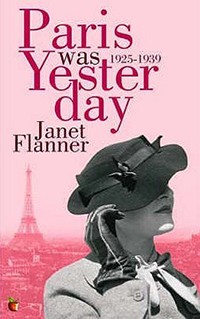Some heavier sensitive reality
 Paris was Yesterday: 1925–1939
Paris was Yesterday: 1925–1939
Janet Flanner
I chose this book as my next read for the Classics Club on the back of an article Siân Norris wrote last year on For Books’ Sake about the women of the Left Bank. I’m one more of the many people fascinated by Paris of the early twentieth century but I’m also a feminist, so the idea of finding out more about the women writers and artists of that time greatly appeals to me.
Janet Flanner was an American journalist who moved to Paris in 1922 with her lover, actress Solita Solano. In 1925 she began writing the Letter From Paris column for the New Yorker, under the pen name Genêt. This book is a selection from the first 15 years of those columns. It’s a combination of gossip, reviews, obituaries and day-to-day reporting. It’s an at times uneven mix and I don’t know if that’s an accurate reflection of the column or the way this book has been edited.
The book starts strongly, really making me feel the setting and wish I could have experienced it. Flanner clearly wasted no time in getting to the centre of social life in Paris, recounting a series of breathless parties and still-notable first performances. She was there for the première of the Stravinsky ballet Oedipus Rex, with lyrics by Cocteau and costumes by Picasso – can you imagine?
“[Isadora Duncan’s] friends ran the gamut from starving poets down to millionaires. She was prodigal of herself, her art, illusions, work, emotions, and everybody’s funds…Week after week came obscure people whose names she never even knew. They were like moths. She once gave a house party that started in Paris, gathered force in Venice, and culminated weeks later on a houseboat on the Nile. She was a nomad de luxe.”
However, it took me more than a month to get through this book, which I think is partly because the column was not really written to be read this way, one after another non-stop. But it also felt in the middle as if it was mostly obituaries and gossip, which was only interesting when it related to names I already knew. So the furore around the publications of Ulysses and The Autobiography of Alice B Toklas? Wonderful, fascinating. The obituaries of Marie Curie and D H Lawrence were also of great interest to me and written with much intelligence. But the endless parade of names I didn’t know seemed less interesting.
“[Colette’s novel Sido] is enemy to all urban novels, has no plot, and yet tells of three lives all that should be known; it is, indeed, merely a fertile furrow plowed through the writer’s past and turning up her progenitors, their habits, hats, horses, and souls – the little cosmos they swung among, living and loving on the land.”
Then again, there were times when Flanner described something wholly unknown to me with such great style, with such choice selection of which facts to include to entice the reader, that I had to reassess my judgement of her writing. She was good at reporting on trials, which she clearly attended enough of to be familiar with their ins and outs. But where she excelled was politics. She was an astute observer of the world and this came into its own as the 1930s rumbled toward war.
There is an amazing column written from the border with Spain in the final days of the Spanish Civil War about the massive number of refugees struggling to survive. There are several insightful columns about the attempts made to keep peace with Hitler and it was truly haunting reading about the public celebrations of Chamberlain’s “Peace in our time” deal, with the benefit of hindsight. But even more haunting was reading the final column in the book, about the declaration of war, because Flanner’s comments about Hitler and Germany could so easily be written today about Putin and Russia. I really hope history proves me wrong about that parallel.
“All of these important French films show a definite new, and perhaps unconscious, quality – a Gallic romanticism which has everything to do with intellectual modern man’s emotional relation to all of life, and nothing to do with the single thing called Love. Indeed, the often light, usually lunatic mating theme of the more maudlin French movies seems in process of being inspissated, leaving, on its evaporation, some heavier sensitive reality.”
So although this took me a while to get through and there were some dull moments, I am left in no doubt that Flanner was a smart, sparkling woman with an uncanny ability to get to the centre of things, whether that be a high society party, a new show at the Moulin Rouge, a murder trial or the political machinations of all Europe. I definitely want to read more of her work, though it won’t do any good for my Paris obsession!
Published 1973 by Angus & Robertson. Republished with a new introduction in 2003 by Virago Press.
Source: Christmas present from my brother.
Challenges: This counts towards the Classics Club.